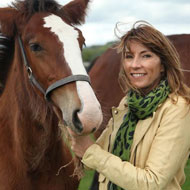Broadcaster Lucy Cooke to deliver CQ keynote speech

Lucy is a passionate conservationist and a champion of weird and wonderful species.
Award-winning TV presenter, producer and zoologist Lucy Cooke will deliver the keynote speech at the Central Qualifications (CQ) Graduation and Awards Ceremony on Saturday, 22 June.
Lucy is a passionate conservationist and a champion of weird and wonderful species. Her popular, immersive style blends extraordinary storytelling with a smattering of humour to reach audiences far and wide.
Lucy began her broadcasting career hosting Freaks and Creeps on National Geographic. Since then, she has presented various television shows for BBC One, ITV and BBC 4, including Nature’s Boldest Thieves and Animals Unexpected.
Her work as a writer and producer on Meet the Sloths won Lucy a Wildscreen Panda Award and spawned a major 13-part series for Animal Planet. Most recently she joined the BBC’s Springwatch team and has competed against Chris Packham on the natural history quiz show, Curious Creatures.
Taking place at Central Hall, Westminster, the CQ graduation ceremony will celebrate the hard work and success of veterinary nurses who have qualified during the course of the past academic year.
This will be followed by the VN Educator of the Year Awards, which pay tribute to the hardworking staff who support students studying for veterinary nursing qualifications.
Last year’s award was jointly presented to Elaine Lamb and Kerry Jackson. Elaine is head of Reaseheath College and programme leader for veterinary nursing while Kerry is training coordinator for the Veterinary Nursing Diploma programme at Goddard Veterinary Group.
For more information about the award and to make a nomination visit http://cqual.org.uk/cq-en/awardsnomination.php



 The RCVS has announced a new version of its 1CPD mobile app, with enhanced features for veterinary surgeons and veterinary nurses to record their continuing professional development.
The RCVS has announced a new version of its 1CPD mobile app, with enhanced features for veterinary surgeons and veterinary nurses to record their continuing professional development.